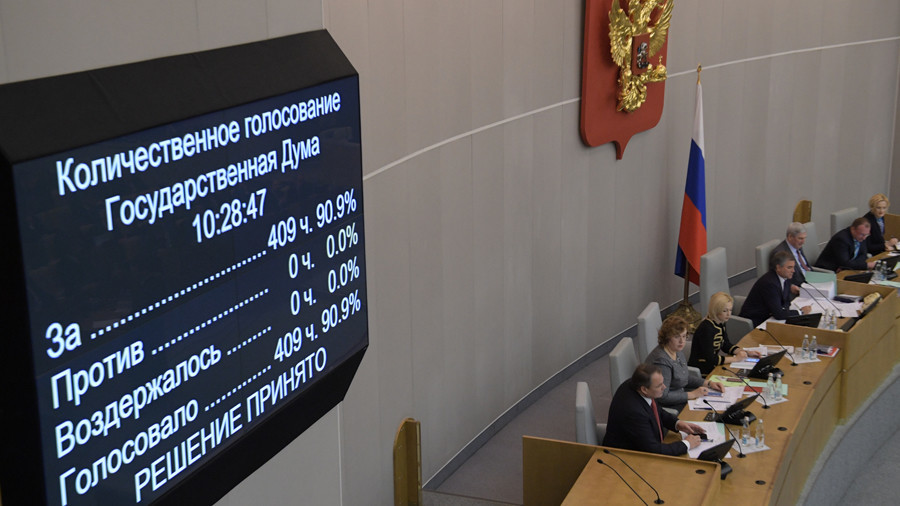CrossTalk: Is RT a Foreign Agent?
According
to the Department of Justice RT – the channel you are watching now
– is an agent of a foreign, even hostile power. All the while the
DOJ refuses to explain why this is the case or even cite what laws we
may have broken. But something else is in play: Critics warn RT is a
test case for a wider campaign of media suppression.
CrossTalking
with Lee Stranahan, Rocky Anderson, and Marcus Papadopoulos.

Russian
MPs pass foreign agent bill for media in ‘mirror response’ to US

RT,
15
November, 2017
Russian
State Duma on Wednesday passed in the third and final reading the
bill require mass-media outlets operating in the country but funded
from abroad to register as foreign agents.
The
motion was prepared by State Duma Speaker Vyacheslav Volodin and the
heads of all four parliamentary caucuses. It was drafted as a suite
of amendments to the bill, allowing for websites of banned or
extremist organizations to be blocked without requiring approval from
the courts.
The
text of the amendment defines affected mass-media outlets as legal
entities that are “registered in a foreign nation, or a foreign
structure that operates without registering as a company, engaged in
spreading printed, audio, audio-visual or any other content prepared
for an unlimited group of people.”
It
states that such entities can be “recognized as foreign mass media
executing the functions of a foreign agent if they receive monetary
funds or other property from foreign states, government agencies,
foreign-based and international organizations, foreign citizens and
persons without citizenship or any other persons acting on behalf of
foreign citizens and organizations,” according to TASS.
The
bill does not mention any particular companies or countries. It
specifies that the final decision in classifying mass media outlets
as foreign agents should be made by the Justice Ministry. The
ministry is also tasked with developing instructions regarding the
obligatory marking of products released by mass-media outlets
registered as foreign agents, and deciding whether it is necessary to
maintain a separate register of such organizations.
Media
outlets that refuse to register as foreign agents would face
sanctions similar to those applied to NGOs and other groups, which
are currently regulated by the original foreign-agents law.
One
of the key sponsors of the new bill, Deputy Duma Speaker Pyotr
Tolstoy (United Russia) called the motion “a forced decision that
would not affect the freedom of speech in any way.”
“We
are talking about an opportunity for the executive-power bodies to
take mirror measures against countries that are infringing upon
Russian journalists’ freedom of action and expression,” RIA
Novosti quoted Tolstoy as saying.
Vladimir
Putin’s press secretary, Dmitry Peskov, approved of the newly
passed bill on Wednesday. “Any attempts to attack the freedom of
Russian mass media abroad are not and will not be left without
resolute denunciation and a mirror reaction from Moscow. The approved
bill will make it possible to express our reaction in due time,” he
said.
Russian
lawmakers began to draft the legislative measures after the US
Department of Justice ordered RT America to register as a foreign
agent before November 13, threatening to freeze the company’s
assets and arrest its head if it did not comply. On November 10, RT
America (officially registered as T & R Productions LLC) filed as
a foreign agent with the US Department of Justice.
The
original Russian Foreign Agents Law, introduced in late 2012, obliges
all NGOs that receive funding from abroad and are engaged in
political activities to register as foreign agents or risk
substantial fines. In November 2014, the law was expanded by a bill
making it illegal for Russian political parties to receive
sponsorship from, or enter into any business deals with, NGOs that
have “foreign-agent” status.
Many
rights groups in Russia and abroad protested against the move, saying
it would jeopardize their existence, and complained about ‘loose
definitions’ in the original document. In mid-2016, President
Vladimir Putin signed a bill into law that defined the term
“political activity of non-governmental organizations” and
exempted charity groups receiving funding from abroad from having to
register as foreign agents.



No comments:
Post a Comment
Note: only a member of this blog may post a comment.